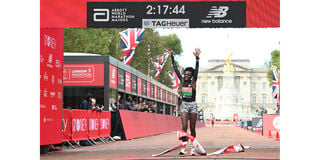Athletics Kenya intervenes as KRA seizes marathoner Jepkosgei's running gear

Kenya's Joyciline Jepkosgei crosses the line to win the women's race of the 2021 London Marathon in central London on October 3, 2021.
What you need to know:
- A KRA official, who spoke on condition of anonymity, emphasised that athletes are not exempt from paying taxes, noting that they are subject to the East African Community Customs Management Act 2004, which outlines who qualifies for duty exemptions.
- The official stated that Jepkosgei’s 40 pairs of shoes were not for personal use and therefore required duty payment.
Athletics Kenya (AK) has issued a stern warning to athletes, their management, and coaches, reminding them that they will be required to pay duty for any sports equipment brought into the country without prior clearance or notification.
Barnaba Korir, AK’s director of youth and development, emphasised that these parties must declare in writing every sports item they plan to bring into Kenya and the intended beneficiaries. Once confirmed, AK will communicate the details to the Kenya Revenue Authority (KRA) for the necessary clearance.
However, Korir stressed that AK will not tolerate any abuse of this process for personal gain, warning that any sports equipment brought in without following the proper procedure will attract customs duty.
Korir made these remarks following AK’s intervention to have marathon runner Joyciline Jepkosgei's bags, containing 40 pairs of running shoes, cleared at Jomo Kenyatta International Airport (JKIA) on Wednesday, October 16.
Jepkosgei, who finished fifth at the Chicago Marathon on Sunday, had planned to distribute the shoes to athletes at her camp in Iten, Elgeyo Marakwet. The shoes, which were in the custody of her coach Peter Bii, were detained by KRA officials upon arrival from Chicago on Tuesday night.
"Rules must be followed, and athletes must adhere to them, or we risk attracting the wrath of KRA, which has been kind to us," Korir said, adding that KRA is well within its mandate to charge customs duty.
He noted that AK regularly reminds athletes to notify them in advance about such matters, but many ignore this requirement, only to complain when customs officers detain their goods.
“But we will not write to KRA for an exemption if we suspect athletes, coaches, or management are trying to conduct business. Every item entering the country must have the name of the athlete it will benefit, and we will ensure that happens,” Korir emphasized.
Jepkosgei expressed her gratitude to AK for helping her clear the shoes, stating that they were intended solely for her colleagues in camp and not for commercial purposes.
“I wasn’t aware I needed to inform AK for exemption, but it’s good that KRA considers such exemptions, as it will help athletes,” said Jepkosgei, the 2019 New York City Marathon and 2021 London Marathon champion.
Korir further explained that many countries enforce strict taxation on goods entering from abroad, citing the example of Lima, Peru, which hosted the World Athletics Under-20 Championships in August.
Nike, the official kit sponsor for Team Kenya, shipped 40 uniforms from the USA to Lima, but the shipment was detained by customs, who demanded 100 percent duty.
“They even refused to ship it to Kenya, and it had to be returned to the USA,” Korir recounted, adding that the kit was eventually received in Brussels, Belgium, during the Diamond League final last month.
In a related incident, the 2022 World 10,000m silver medallist Daniel Simiu, who also competed in the Chicago Marathon, had his luggage detained. Simiu, who finished fifth in his marathon debut with a time of 2:06:04, reportedly had items worth more than Sh350,000 in his luggage.
A KRA official, who spoke on condition of anonymity, emphasised that athletes are not exempt from paying taxes, noting that they are subject to the East African Community Customs Management Act 2004, which outlines who qualifies for duty exemptions. The official stated that Jepkosgei’s 40 pairs of shoes were not for personal use and therefore required duty payment.
“We didn’t create these laws; we simply enforce them on behalf of the East African Community Parliament. Athletes, like any other returning citizen, must pay duty,” said the official.
The official clarified that personal items valued under $2,000 (Sh260,000) are exempt from customs duty, but any excess, including gifts and donations like Jepkosgei’s shoes, will attract duty.
Regarding Simiu's case, the official noted that the athlete’s luggage contained items that exceeded the exempted value, adding, “They need to be truthful, or they could find themselves in bigger trouble.”
The official urged athletes to educate themselves on customs duties to avoid escalating situations they do not fully understand on social media.




